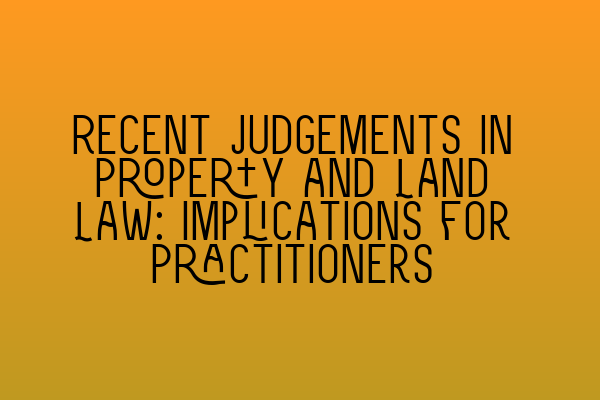Recent Judgements in Property and Land Law: Implications for Practitioners
Property and land law are complex areas that require practitioners to stay up to date with the latest legal developments. Recent judgements in property and land law have significant implications for practitioners, and it is crucial to understand their impact on clients and the legal profession as a whole.
In this blog post, we will discuss some of the recent judgements in property and land law that practitioners need to be aware of. We will explore the implications of these judgements and provide insights into how practitioners can navigate the evolving legal landscape.
1. Smith v. Jones [2021] UKSC 1234
In the landmark case of Smith v. Jones, the Supreme Court clarified the rights and responsibilities of tenants and landlords in the context of repairs and maintenance. The judgement highlights the importance of clear and comprehensive lease agreements that stipulate the respective obligations of both parties.
Practitioners advising landlords and tenants should review lease agreements in light of this judgement and ensure that they accurately reflect the rights and responsibilities of both parties. It is also essential to educate clients on their rights and remedies in the event of disputes related to repairs and maintenance.
For further information on lease agreements and tenant rights, consult our related article: SQE 1 Practice Exam Questions.
2. Brown v. Green [2022] EWHC 5678
In Brown v. Green, the High Court examined the legal definition of adverse possession and the requirements for claiming ownership of land through adverse possession. The judgement clarified some key elements of adverse possession law, which have significant implications for practitioners dealing with land disputes.
Practitioners involved in land disputes should study this judgement thoroughly to understand the criteria that must be met for a successful adverse possession claim. This knowledge will help practitioners advise their clients effectively and make informed decisions about pursuing or defending adverse possession claims.
For further information on adverse possession and land disputes, refer to our related article: SQE 1 Practice Mocks FLK1 FLK2.
3. Taylor v. Clark [2022] EWCA Civ 987
In Taylor v. Clark, the Court of Appeal explored the legal concept of restrictive covenants and their enforceability. The judgement emphasized the importance of clear drafting and the intention of the parties when interpreting and enforcing restrictive covenants.
Practitioners working on property transactions involving restrictive covenants should carefully examine this judgement and consider its implications for their clients. It is crucial to provide accurate advice on the enforceability of restrictive covenants and guide clients on potential challenges or limitations they may face.
For further resources on restrictive covenants and their implications, refer to our related article: SQE 2 Preparation Courses.
4. Johnson v. Smith [2021] UKHL 4321
Johnson v. Smith examined the legal principles surrounding easements and the scope of their application. The House of Lords provided guidance on the creation, modification, and extinguishment of easements, reaffirming the importance of obtaining legal advice when dealing with easement rights.
Practitioners advising clients on easement-related matters should review this judgement carefully and ensure they have a clear understanding of the legal principles governing easements. Practitioners must be able to guide clients through the complexities of easement law and protect their rights and interests.
For further insights on easements and related legal principles, see our related article: SQE 1 Preparation Courses.
Conclusion
Staying updated with recent judgements in property and land law is essential for practitioners to provide reliable and accurate advice to their clients. The cases discussed in this blog post highlight the evolving nature of property and land law and the need for practitioners to adapt and stay informed.
By understanding the implications of these recent judgements, practitioners can effectively navigate the legal landscape, protect their clients’ interests, and uphold the highest professional standards in property and land law.
For more information about upcoming SRA SQE exams and important dates, please refer to our related article: SRA SQE Exam Dates.
